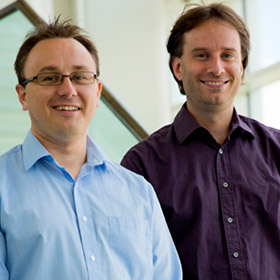Recent Stories
- Businesses urged to tap into science and technology young talent
- Digital relay baton enables remote crowd cheering of athletes
- Health Innovation Campus moves a step closer
- £7.1 million R&D boost for North West businesses
- Centre of excellence created for the next industrial revolution
- Artificial intelligence toolkit spots new child sexual abuse media online
- Strategic partnership set to help plug cyber security skills gap
- What your choice of smartphone says about you
- InfoLabTree: Discover the Story
- novi.digital Launch Event - 'An Event to Help Businesses Grow Online'
RSS Feeds
RSS feeds can deliver the latest InfoLab21 news and events direct to your browser without you having to visit the website.
In most browsers you can click on an RSS link and choose to subscribe to the feed to add it to your favourites or bookmarks.
Lancaster University spin-out company named one of the world’s top tech marketing start-ups
 L-R: Dr Phil Greenwood and Dr James Walkerdine
L-R: Dr Phil Greenwood and Dr James Walkerdine
One of the world’s biggest companies has recognised Relative Insight as a top 50 global tech marketing start-up.
Unilever’s Foundry 50 has chosen Relative Insight, which started life in Lancaster University’s School of Computing and Communications, from more than 3,000 start-ups in marketing, research and data science.
Relative Insight uses innovative analysis software to help brands turn language into data. Dimensions such as demographics, groups and time are all automatically analysed to help brands identify and understand relevant audiences and to maximise their engagement strategies.
The company was started by former Lancaster University researchers Dr James Walkerdine and Dr Phil Greenwood, who originally developed the technology to help law enforcement identify criminals online.
Working in partnership with Lions Innovation, Unilever set up the Foundry initiative to find the top 50 new marketing technology companies that are “innovating to help brands better connect, engage and relate with people.”
Dr James Walkerdine, Chief Operating Officer at Relative Insight, said: "We are incredibly honoured and excited to be part of Lions Innovation. It’s been a remarkable 12 months for the company, and it's great that our ongoing unique collaboration between the University and Relative Insight has resulted in this level of recognition."
Relative Insight’s software is also used by students studying Marketing at Lancaster University Management School (LUMS), giving them valuable real-life skills.
Richard Meek, from LUMS’ Department of Marketing, said: "Relative insight is to be congratulated on achieving wider industry recognition of their innovative technology, which our students have been excited to experience in the last year.
"Competitive success is increasingly dependent on technological competence and consequently now an important part of marketing education."
All the start-ups had to meet the following criteria: be innovative and distinctive from competitors already in the market; relevant and interesting to the brand and marketing industry; established within the past five years; and raised less than $10 million in equity funding.
Fri 26 June 2015



